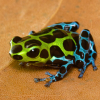As long as the material the ants are kept in doesn't extremely actively suck water out, won't a tube of water plugged with cotton in the outworld be sufficient?
I thought most species will spit up water in the nest if it's too dry as well

As long as the material the ants are kept in doesn't extremely actively suck water out, won't a tube of water plugged with cotton in the outworld be sufficient?
I thought most species will spit up water in the nest if it's too dry as well
It's more important about the humidity than the water itself which would be harder for ants to change (different species have their own preferences).
Aphaenogaster cf. rudis
Tetramorium immigrans
Tapinoma sessile
Formica subsericea
Pheidole sp.
Camponotus nearcticus
I would speculate that ant larvae, like many soft-bodied insects, have hygroreceptors that are sensitive to the conditions best suited for development. The larvae likely emit some sort of pheromonal distress signal when they start to dry out in order to stimulate nurse workers to move them to a more desireable location, after which they would stop producing the signal.
While some species' larvae have evolved a thicker, waxier cuticle, making them less susceptible to desiccation, it is important to note that no ant species have evolved in bone-dry, air-conditioned environments, and so some intermittent moist periods (with sufficient ventilation for drying out quickly) are probably required for even dry-loving genera like Camponotus. If your ants are "spitting" in the nest to make it more humid—which is a behavior I have observed as well—then it is probably too dry.
0 members, 0 guests, 0 anonymous users